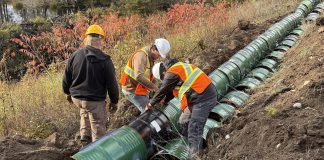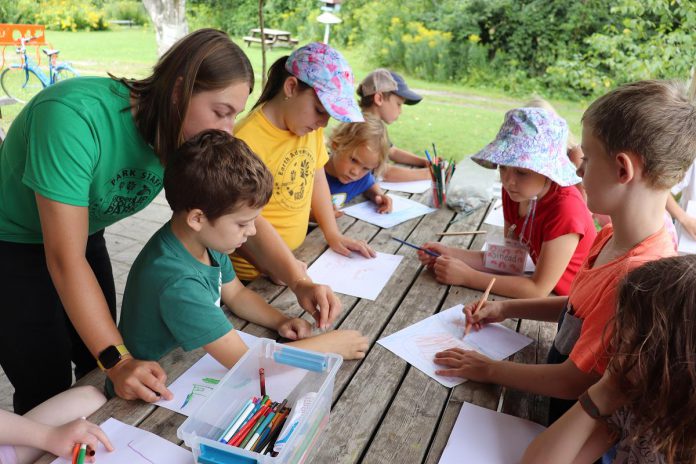
With the climate crisis worsening and the need for local climate action increasing, GreenUP’s work to promote sustainability, environmental education, and green living is more important than it has ever been in the non-profit charity’s 30-year-plus history.
However, GreenUP is facing critical financial challenges that could impact the organization’s ability to support the long-lasting change necessary for ensuring a healthy and sustainable community in the face of an increasingly unstable climate.
“It’s an emergency and we need to be acting like it’s an emergency,” says GreenUP’s executive director Tegan Moss. “We need to make sure that our plans for the future are well-grounded in the scale of emergency that we’re currently facing.”
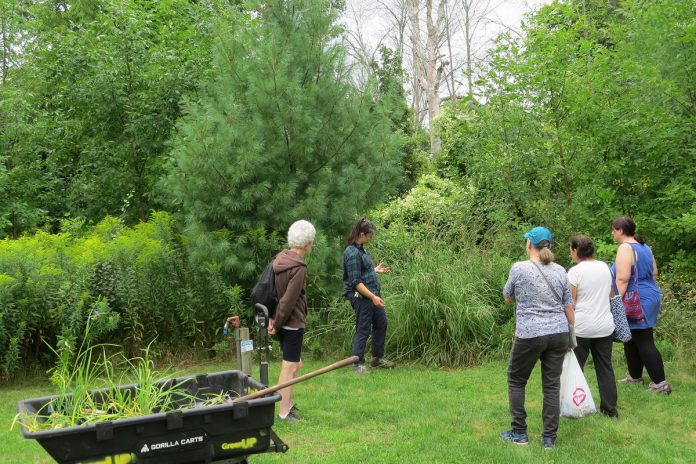
Where other organizations may focus on a single priority area, GreenUP has always spread its focus and funds across several priority areas as needed, including sustainable transportation, green infrastructure, waste management, energy efficiency, and other critical environmental initiatives.
GreenUP has funded this work through multiple revenue streams, including community donations, government funding, and revenue-generating programs and services. Unfortunately, with today’s government funding priorities, changing consumer trends, and rising inflation, these revenues no longer add up to what they once did.
“GreenUP has been really successful largely because of our diversity of approaches,” says Moss. “As our communities face unexpected challenges like homelessness and the opioid crisis, it can become really difficult for donors to prioritize the threat of climate change which, in so many ways, often isn’t visible.”
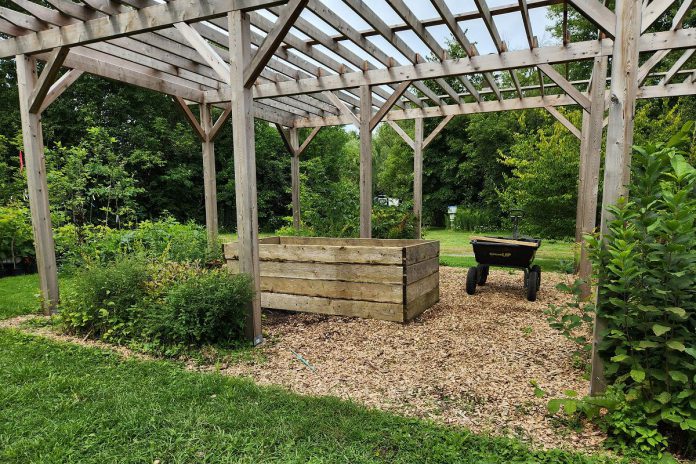
One of the organization’s ongoing successes in local climate action can be found at GreenUP’s Ecology Park, whose native plant nursery propagated 2,500 native plants and trees this year. Not only did many hundreds of residents purchase these plants and trees, but they walked away with more knowledge about the importance of native species for the environment.
“We’re really excited to literally grow some of the plants and trees that we see as being one of the solutions to climate change,” Moss says. “We often direct community donations to Ecology Park, and they will continue to go towards our propagation project.”
The lath house project success was made possible after a community fundraising campaign supported the reconstruction of the structure in Ecology Park to support the growth of more shade-loving native plants. The rebuilding of the lath house followed other upgrades funded by a five-year capital campaign to make the public five-acre park a destination for environmental education and more accessible to everyone, including by building of the children’s education shelter, accessible pathways to the Trans Canada Trail, and barrier-free restrooms.
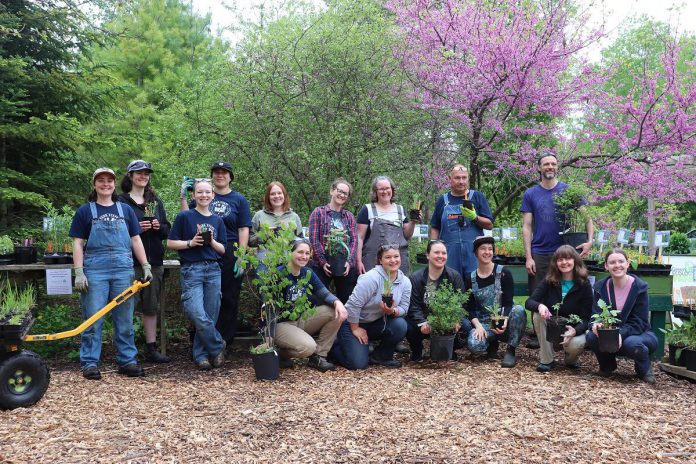
While Ecology Park remains one of GreenUP’s most successful initiatives, it comes at a significant cost.
“The reality is that the operation of Ecology Park is a really major cost for our organization every year,” says Moss. “It’s important for us to be funding the team that’s on the ground in the park, caring for the grounds, and answering questions for people who come through every day.”
Along with the native plant propagation project at Ecology Park, GreenUP also supported the planting of 1,500 trees across Peterborough along with four Little Forests at local schools. Community donations supported the Peterborough Community Orchard Stewards, a project that relies on the support of volunteer community members to plant and maintain a series of mini-orchards and food forests in public spaces across Peterborough.
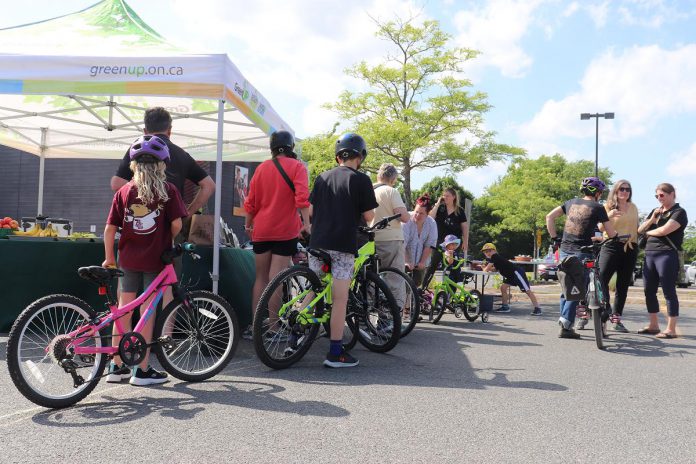
In addition to the planting of native species, GreenUP also supported local climate action by promoting the annual Shifting Gears May Challenge, which saw participants taking 6,472 active and sustainable trips during the month, accounting for 46,627 kilometres of travel by walking, cycling, and using public transit.
Despite this accomplishment, GreenUP’s active transportation program, which promotes planet-friendly modes of transportation among children and youth, has lost funding due to the provincial government’s shift in priorities, leaving GreenUP more reliant on municipal funding for the program.
“It means that the municipal investment isn’t going as far,” says Moss. “We’re working to still benefit the same school communities, but without that provincial support.”
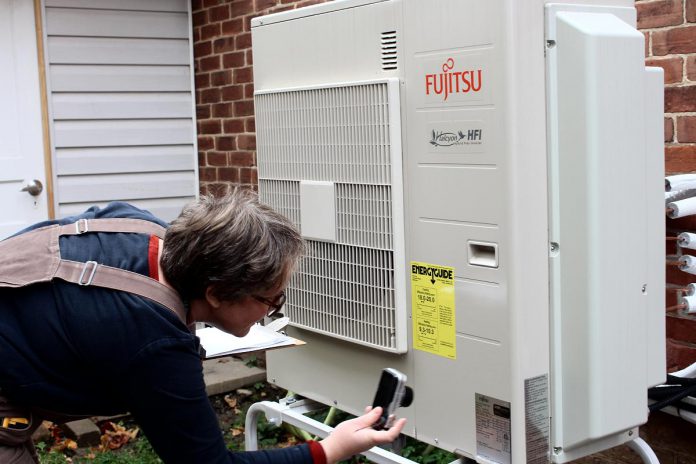
A shift in funding priorities by the federal government has also affected GreenUP’s home energy program which helps to reduce local energy usage and greenhouse gas emissions.
The Canada Greener Homes grant, which provided homeowners with up to $5,000 toward energy efficiency upgrades, unexpectedly ended earlier this year. While the program was supposed to last seven years, it was cancelled after just three.
“GreenUP continues to generate revenue from our home energy services, but not at the levels that Greener Homes grant drove demand for,” Moss says.
“We were seeing very accelerated emissions reductions as a result of the Greener Homes program,” she adds, noting the program saw Peterborough homeowners collectively save 14,800 gigajoules of energy this year alone — equivalent to taking 104 homes off the power grid.
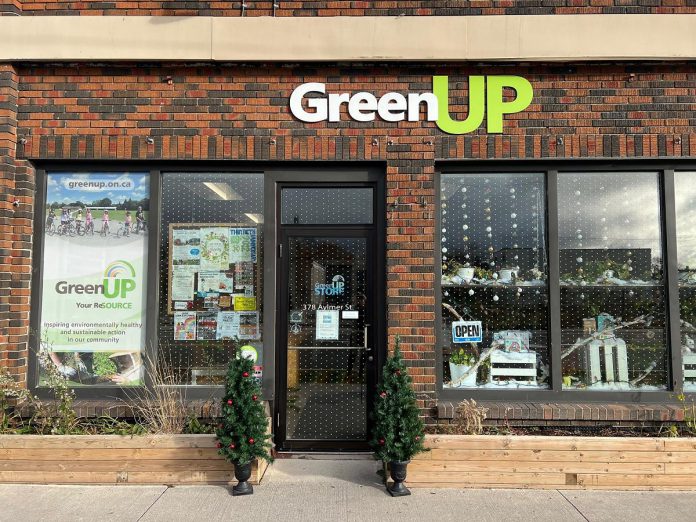
To help deal with funding reductions, GreenUP has been taking a look at its operations — including what was once a key revenue-generator for the organization: the GreenUP Store in downtown Peterborough.
A social enterprise originally established to promote eco-friendly products from local businesses while generating revenues to support the organization’s environmental work, the store has seen over a 30 per cent reduction in sales since the pandemic.
As running the GreenUP Store is no longer financially viable, GreenUP has made the difficult decision to close the store in the new year.
“For years, the GreenUP Store served as a bridge, helping the community access sustainable products while contributing funds to GreenUP’s programs,” Moss explains. “Unfortunately, this model no longer serves GreenUP in the way we need it to.”
“While this closure feels like a loss, the widespread availability of sustainable products that were once very hard to find is a win. This will create room for us to focus on fostering awareness in other areas, changing mindsets, and advancing sustainability through our programs.”
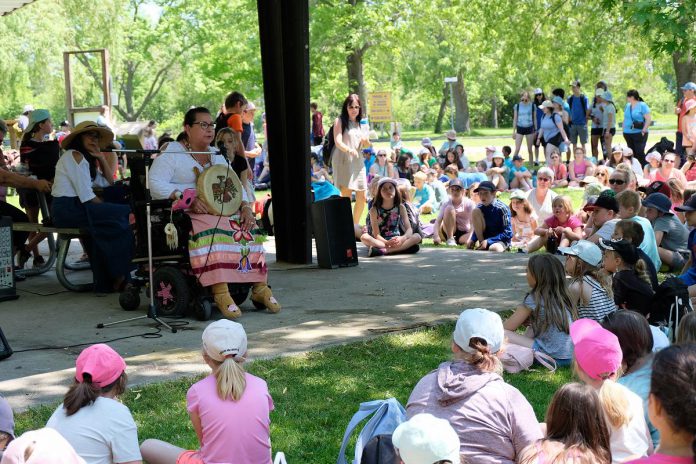
Another program affected by a loss of funding is the annual Children’s Water Festival, which educates local elementary school students about the importance of water and was previously funded by the Peterborough Utilities Commission. This year’s festival saw an impressive 1,300 local students participating but, without the funds to replace the financial loss, the educational festival could be at risk.
“It’s been delivered every year over the last 22 years, and we would be really proud to continue offering that program on an annual basis,” says Moss.
GreenUP is looking to replace $8,000 of funding for the festival that was previously provided by Peterborough Utilities Commission. Moss notes that the loss the Peterborough Children’s Water Festival would deny our future sustainability leaders an important milestone in their childhood education.
“Sustainability connects to almost every aspect of our daily lives,” she says. “Because there are so many layers to that learning, we need to be invested as learners and as people who are committed to sustainability to continue deepening that journey over time.”
Moss notes that the Children’s Water Festival and other environmental education programming is fundamental to instilling knowledge and interest in sustainability from a young age.
“These landmark activities that we engage in with young people help them develop informed and critical understandings of these issues, help them have foundational experiences, and help them to become champions related to the cause,” she says. “Education is underpinning how we can become engaged members of our society and active participants in creating a more sustainable community.”
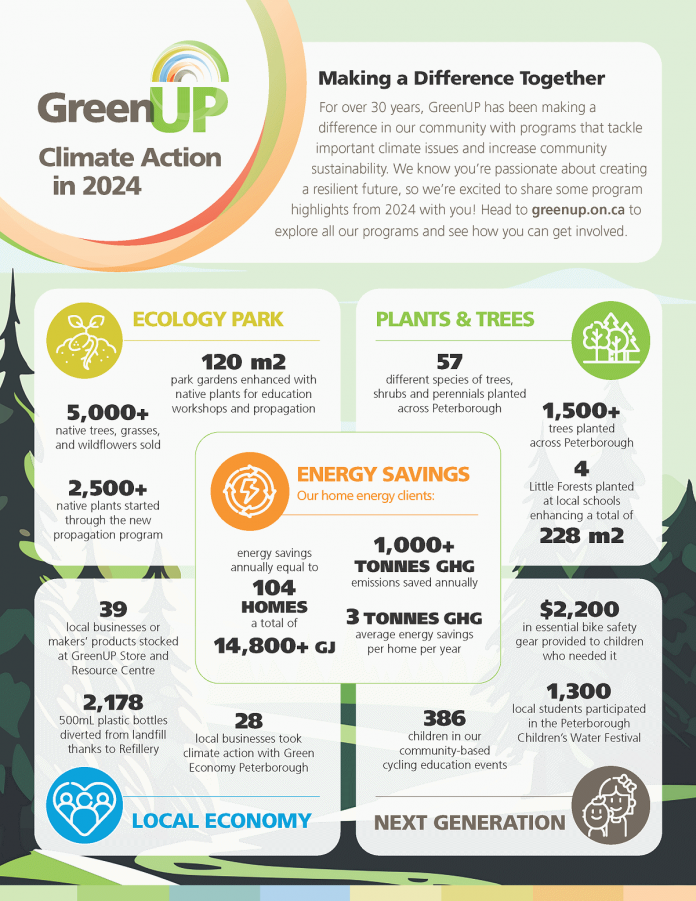
While the climate crisis can seem overwhelming and beyond our ability as individuals to fix, Moss notes that we can all do our part by taking action locally — and that includes supporting the work of environmental organizations like GreenUP to help make communities more sustainable.
“We do deeply appreciate it when folks are able to support us,” Moss says. “It’s important they know that we’ll do everything we can to make sure their dollars go as far as they can to impact our community in really positive ways.”
To support GreenUP, visit www.greenup.on.ca/donate-now, where you can make a one-time donation or become a Friend of GreenUP by committing to a monthly donation.
This branded editorial was created in partnership with Peterborough GreenUP. If your organization or business is interested in a branded editorial, contact us.


























